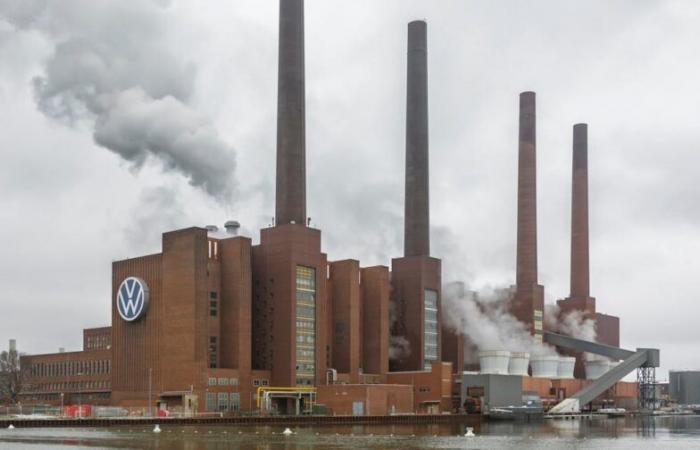Symbol of German power, Volkswagen is facing significant financial difficulties. How did the emblem of “Deutsche Qualität” get there? Can he get out of this? How ?
At the end of October 2024, the Volkswagen works council announced that the group's management was considering the closure of three factories in Germany, which would lead to the loss of tens of thousands of jobs, as well as a general reduction in wages. With more than 200 billion euros in debt, Volkswagen has become the most indebted listed company in the world. Its sales are at half mast and its costs (notably energy, personnel and research and development costs) have exploded. As of October 30, the group confirmed these fears by announcing a 63.7% drop in its net profit in the third quarter.
How did the leading European automobile manufacturer, the leading industrial employer in the country of Deutsche Qualität, symbol of Rhineland capitalism and harmonious co-management between shareholders and unions, get there? Certainly following a series of strategic errors, baroque governance and toxic management practices.
A German model
Volkswagen was founded in May 1937 by Austrian engineer Ferdinand Porsche, in response to Adolf Hitler's request for a “people's car” (literally Volkswagen in German). It was the Beetle, a robust, practical and economical vehicle, which sold more than 15 million copies, succeeding the Ford Model T as the greatest success in the history of the automobile.
However, at the end of the 1960s, the design of the Beetle (air-cooled rear engine, propulsion) showed its limits. The company sees its salvation in the acquisition of its competitors Auto Union and NSU, merged into the Audi brand, which bring it their skills in the design of front-wheel drive vehicles. Volkswagen then became a real group and the Golf (water-cooled front engine, traction), launched in 1974, the symbol of its rebirth.
During the 1980s and 1990s, the Volkswagen group experienced very strong expansion through external growth, with the purchase of the Spanish Seat in 1988, the Czech Škoda in 1991, then the English Bentley and the Italian Lamborghini in 1998, without forgetting MAN and Scania trucks, Ducati motorcycles or Bugatti hypercars. Its share of the European market increased from 12% in 1980 to 25% in 2020. In 2017, the group dethroned Toyota for the first time as the world's leading automobile manufacturer. Volkswagen was then at the height of its glory, its slogan – somewhat arrogant – was “Das Auto” (“The car”), but its fall was going to be resounding.
The dieselgate affair
The grain of sand in this beautiful industrial mechanism will come from the United States. In 2015, the modest American Environmental Protection Agency revealed that the Volkswagen TDI type EA 189 diesel engine emits up to 22 times more nitrogen oxide (NOx) than the current standard. Volkswagen then admits having equipped its vehicles since 2009 with “faking” software capable of identifying the test phases, and reducing NOx emissions only during these phases. On the other hand, in normal times, the software is inoperative and the vehicles are therefore much more polluting than advertised, which constitutes fraud vis-à-vis the authorities and deception vis-à-vis customers. Problem is, the EA 189 type engine was then sold on more than 11 million vehicles in the group, divided into 32 models.
The scandal is resounding. As legal actions multiply in the United States, but also in Europe, the share price of the Volkswagen group falls by 40% on the Frankfurt Stock Exchange. The chairman of the group's management board is forced to resign. In 2024, while all the judgments have not yet been rendered, it is estimated that this case has already cost Volkswagen more than 32 billion euros.
Anxious to redeem its virginity, while the image of its diesel engines is irreparably tarnished, Volkswagen is launching a colossal plan to convert to electric vehicles, with the announcement in 2023 of an investment of 122 billion euros. Unfortunately, its first electric models, too uncompetitive with Tesla or Chinese manufacturers, are struggling to convince in a market generally at half mast since the Covid-19 pandemic.
An economic model that is slipping
More generally, since at least the beginning of the 2000s, the heart of the Volkswagen group's strategy was relatively clear – and indeed shared by most of German industry, with the active support of Chancellors Gerhard Schröder and Angela Merkel: sell German quality to the Chinese, made using Russian gas. Two events will precipitate this model towards the abyss: the European embargo on Russian gas following the outbreak of the war in Ukraine, which will cause the cost of energy to explode, but above all China's desire for self-sufficiency in automotive material.
In the 1970s, Volkswagen was one of the very first Western manufacturers to invest in China. It has been the local market leader for over 25 years. In the mid-2000s, if taxis in Shanghai were almost all Volkswagens, any dignitary of the Chinese Communist Party had to drive a black Audi A6 with tinted windows. Specific extended models of Audi A6 had even been specifically designed by Volkswagen according to the wishes of the party, and Western expatriates in Beijing also bought black Audi A6s with tinted windows, knowing that no policeman would take the risk of bothering them , for fear of dealing with an influential political figure.
When Beijing roars
However, in recent years, the instructions of the Chinese Communist Party towards its fellow citizens – and its dignitaries – have changed: the Chinese must now drive Chinese. This turnaround is particularly problematic for the profitability of the Volkswagen group. Indeed, Audi had become its main source of profits, and these profits mainly came from China. This time is over, not to mention that Chinese manufacturers like BYD – largely supported by their government – have developed electric vehicles against which the Volkswagen group's productions have difficulty justifying their price premium.
Read more: Dieselgate, a consequence of contradictory injunctions in the automobile industry
In this regard, it is amusing to recall that the mention “Made in Germany”, which for decades ensured the worldwide success of German products, was initially a mark of infamy: in the 19the century, it was demanded by English industrialists, who were offended to see their products copied by German imitations of mediocre quality, sold at low prices, which they considered to be unfair competition. To be able to continue to sell in Great Britain, German manufacturers therefore had to resolve to systematically include “Made in Germany” on their products, which at the time aroused approximately the same distrust as “Made in China”. nowadays. The wheel is turning, and it is now Chinese productions that are quickly gaining recognition.
Constrained governance
Added to this strategic loss of steam at Volkswagen is particularly problematic governance. The founder of Volkswagen, Ferdinand Porsche, had two children: a girl, Louise, and a boy, Ferdinand (nicknamed Ferry). Louise married lawyer Anton Piëch in 1928, who managed the main Volkswagen plant from 1941 to 1945. For his part, Ferry largely developed the Porsche sports car brand, founded by his father in 1931.
Since then, the Piëch cousins and Porsche have engaged in fierce competition for control of Volkswagen, which reached its peak in 2007, when Porsche attempted to buy the Volkswagen group, although fifteen times its size. The failure of this operation led by the Porsche family instead led to the takeover of Porsche by Volkswagen.
[Déjà plus de 120 000 abonnements aux newsletters The Conversation. Et vous ? Abonnez-vous aujourd’hui pour mieux comprendre les grands enjeux du monde.]
The central figure in this turnaround was Ferdinand Piëch, son of Louise, who had started his career with his uncle Ferry, before joining Audi, then becoming chairman of the management board of the Volkswagen group in 1993, then of the supervisory board in 2002. In addition to his perfect knowledge of the group (and of Porsche, in which he personally held 13.2% of the capital), Ferdinand Piëch was able to attract the support of the state of Lower Saxony, where the group's headquarters are located, and which holds 20% of its shares. However, the former Minister-President of Lower Saxony was none other than Gerhard Schröder, German Chancellor from 1998 to 2005.
This tangle of family struggle and political influences has certainly not facilitated serenity within the management bodies of the Volkswagen group. Added to all this are often toxic management practices.
A toxic managerial culture
Certainly influenced by family rivalries and the uninhibited arrogance of having become world number one, Volkswagen's managerial culture experienced a drift that could be described as toxic during the era of Ferdinand Piëch.
Known for his intransigence, his ambition and his authoritarianism, Ferdinand Piëch frequently fired officials he deemed insufficiently efficient. He even says that his favorite response, when a subordinate presented him with a problem that he had not been able to resolve, was: “I know the name of your successor…”. He never hesitated to carry out this threat, which may explain why certain managers took reckless risks, particularly during the Dieselgate affair. Whatever the case, this culture of fear has certainly not facilitated the questioning that has become essential.
We can also note that since the Dieselgate affair, several presidents of the group's management board have called for the emergence of a new, more decentralized corporate culture, favoring speaking out, even encouraging whistleblowers. . However, changing a culture is certainly one of the most difficult managerial tasks there is, and it is not the urgency in which Volkswagen now finds itself that will allow it to do so with serenity.
Overall, what is the future of Volkswagen? The collapse of its Chinese windfall, its lack of success in the electric sector, the still incomplete fallout from dieselgate, its colossal debt, the necessary overhaul of its culture, its strategy and its governance are obstacles that are nothing less than titanic.
However, just as a former General Motors executive said in the 1950s: “What's good for GM is good for America”, we can assume that Germany will never let Volkswagen, which thanks to its success, become – but also because of its contradictions – a true German myth.






